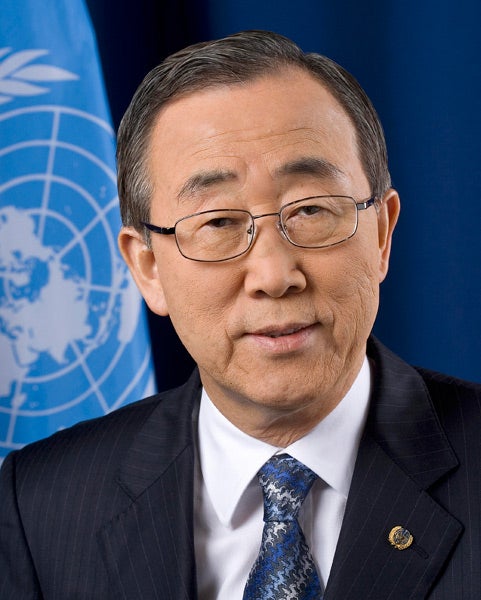|
January 7, 2013
Stanford talk by UN Secretary-General Ban Ki-moon
United Nations Secretary-General Ban Ki-moon will discuss the UN's role in a world in transition in a free public talk at Stanford on Jan. 17. 
UN Secretary-General Ban Ki-moon will speak at Stanford on Jan. 17. (Photo courtesy of the United Nations)
Ban Ki-moon, the eighth secretary-general of the United Nations, will speak about the UN's role in creating opportunities out of the challenges posed by today's rapidly transitioning world in a free public talk at Stanford on Thursday, Jan. 17.
Ban's talk will take place at 4:30 p.m. in Dinkelspiel Auditorium. Free tickets for the event will be available through the Stanford Ticket Office starting Monday, Jan. 7.
"Times of transition are times of profound opportunity," Ban said recently during his acceptance speech for the Seoul Peace Prize. "The decisions we make in this period will have an impact for generations to come."
Ban's initiatives as UN secretary-general have focused on promoting sustainable development; empowering women; supporting countries in crisis or instability; generating new momentum on disarmament, arms control and nonproliferation; and strengthening the United Nations. Among his many activities as secretary-general, he has successfully raised major pledges and financing packages for aid and crisis response, established the agency UN Women and introduced new measures to promote UN transparency and efficiency.
"I grew up in war," Ban has said, "and saw the United Nations help my country to recover and rebuild. That experience was a big part of what led me to pursue a career in public service. As secretary-general, I am determined to see this organization deliver tangible, meaningful results that advance peace, development and human rights."
Ban was born in 1944 in the Republic of Korea, and he served for 37 years with the ROK Foreign Ministry, in roles including minister of foreign affairs and trade, foreign policy adviser to the president and chief national security adviser to the president. He took office as the UN secretary-general in January 2007 and was re-elected for a second term by the UN General Assembly in June 2011. Ban will serve as secretary-general until December 2016.
"We are deeply honored to have UN Secretary-General Ban Ki-moon visit Stanford," said Gi-Wook Shin, a professor of sociology and director of the Walter H. Shorenstein Asia-Pacific Research Center (Shorenstein APARC). "There are few people who understand global trends and dynamics more deeply than he does."
Shorenstein APARC and the Freeman Spogli Institute for International Studies are co-sponsoring the event. Ban's talk, part of the Asia-Pacific Leaders Forum, will kick off a series of activities commemorating Shorenstein APARC's 30th anniversary. Founded in 2005, the Asia-Pacific Leaders Forum regularly convenes senior leaders from across Asia and the Pacific to exchange ideas on current political, economic and social dynamics in the region.
-30-
|